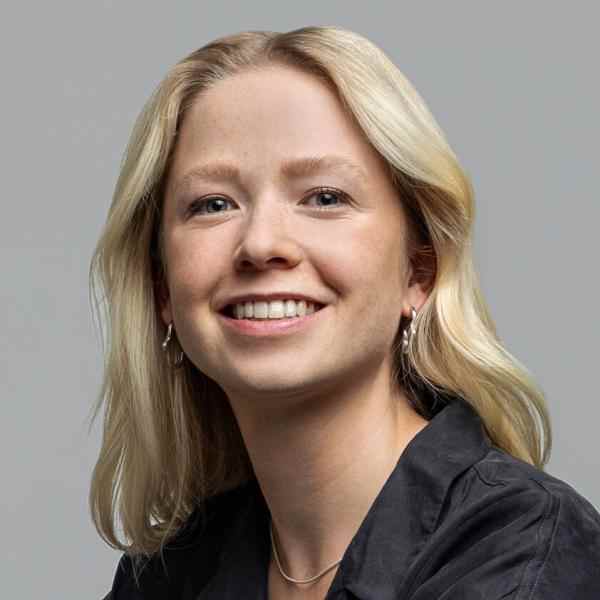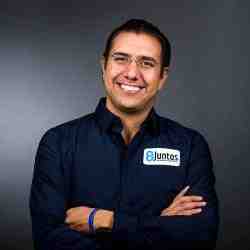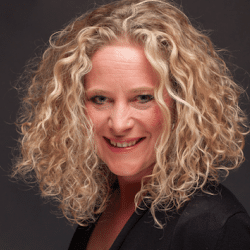Introduction
Hannah lowers barriers to enter the labor market for underrepresented populations. She leverages Artificial Intelligence to address biases in Applicant Tracking Systems, making the initial stage of the hiring process fairer and more inclusive. She also changes the way companies understand and value diverse experience and skills, and how candidates see their own capabilities.
The New Idea
Hannah is lowering the entry barriers to access the job market for underrepresented populations by promoting fairer, non-discriminatory and more inclusive hiring practices in companies in Mexico. She does this by collaborating with companies and hiring managers, working with underrepresented applicants in the labor market, and leveraging Artificial Intelligence (AI) technologies. Through this work and the data that she has obtained though her AI technology, Hannah is shifting companies’ traditional understanding of qualifications and getting them to value more diverse skill sets and backgrounds.
She identified that many applications from underserved populations do not reach hiring managers because they are bounced back by Applicant Tracking Systems (ATS) based on characteristics that disproportionately affect them. To address this issue, Hannah uses a proprietary AI matching system that mitigates biases, so that profiles that would have been discarded by traditional ATS, despite being a good fit for the position, now reach hiring managers. The software can be adapted to many Human Resources (HR) systems, making it an attractive option for companies seeking to implement broad, inclusive hiring practices easily. In this way, Hannah reduces common bottlenecks that discourage companies from changing their practices.
To complement Intrare’s technology, she builds capacity within HR teams to best review applications and lead a hiring process that favors diversity, equity, and inclusion. For instance, she is reframing the value of non-formal education and skills by challenging job postings that require high levels of education for entry-level positions. This requirement often excludes people who are qualified for these jobs but lack the necessary schooling or documentation, such as migrant populations.
Hannah understands that to tackle the problem of low hiring of underrepresented groups it is necessary to work not only with companies, but also with applicants. Through Intrare’s open platform, job seekers can learn best practices to improve their prospects, such as interviewing and negotiation, and access legal counsel to obtain missing documents. This support is especially important for populations with less traditional work experience who may not feel confident in interviews or feel lost when looking for and applying for jobs. They can also overcome the bureaucratic hurdles that often lock them out from formal employment.
Intrare has become a seedbed of champions for employment access who can lead change within industries and expand impact across marginalized communities. Alongside establishing an internal co-leadership group, champions also join a peer community to share best practices across companies. The community incentivizes leaders to demonstrate their commitment to diversity, equity, and inclusion, turning it into a competitive advantage. Meanwhile, job seekers support each other on their journey and build a collective voice to mobilize against employment discrimination.
In terms of future replicability, Hannah’s use of AI technology to debias ATS databases can be contextualized to other regions and countries, with a shift in focus depending on the type of discrimination in different labor markets. Today, Hanhan is already seeking to expand the reach of her impact to Colombia through social franchising and by influencing the recruitment market, such as staffing firms, ATS companies, and professional networking platforms like LinkedIn.
Her engagement model with companies and applicants can also be translated to different contexts. Intrare’s platform allows her to gather detailed data that showcases how hiring in a more inclusive way enhances organizational culture and productivity, leading to benefits like increased efficiency, because of higher satisfaction levels and increased sense of belonging; reduced employee turnover; and higher retention rates. By generating evidence on the tangible benefits for companies, Hannah is encouraging adoption by more employers in and out of Mexico.
The Problem
In Mexico, 42% of the economically active population lives in poverty1. Minority groups, such as migrants, refugees, displaced people, low-income single mothers, women in economically vulnerable situations, people from the LGBTQI+ community, people with disabilities, and older people, face key barriers in accessing well-paying, formal employment that could contribute to breaking cycles of vulnerability and economic marginalization. While educational inequalities are often singled out as a root cause, these populations are excluded even from opportunities they are qualified for due to systemic barriers that lead to fewer job offers and low wages.
Companies rely on traditional recruitment methods and networks that do not reach minority communities effectively. Minority groups frequently lack access to professional networks that are essential for job referrals and opportunities, hindering their ability to secure formal employment or higher paying jobs. Additionally, insufficient access to guidance means that even when job opportunities are available, many individuals from minority groups may not possess the specific skills required to navigate recruitment processes and adequately present their skills. Information asymmetries also leave them unprepared to negotiate higher salaries. Furthermore, many lack identification documents that employers require and face economic and administrative obstacles to obtain them. These factors can limit the pool of potential candidates and reduce the chances of attracting diverse talent.
Hiring managers also have unconscious biases that impact everything from job listings to candidate selection, disproportionately affecting marginalized groups. Unconscious biases are prevalent in hiring, influencing decisions despite efforts to eliminate discrimination. Studies reveal that 85% to 97% of hiring managers rely on intuition, and 48% admit biases affect their choices2. This invisible factor can undermine even the most polished resumes and interviews.
The integration of AI in recruitment processes, through Applicant Tracking Systems (ATS), has intensified longstanding biases and discrimination, exacerbating inequalities in access to employment. They discard resumes and applications based on the wording used in resumes, the schools that candidates attended, their names and last names, gender, age and traditional skills. These biases affect underrepresented minorities in a more pronounced way, making it harder for them to enter the job market. AI biases are often due to the systems' reliance on specific formatting and buzzwords that do not align with the cultural contexts of minority applicants. Less than 5% of companies use AI effectively for candidate management, leading to extended hiring processes that last an average of 40 days and often overlook the potential for reskilling or future growth in candidates3.
There is a growing awareness among Mexican companies about the importance of DEI. Many large corporations, especially those with international ties, have started to implement DEI policies and programs. While gender diversity is gaining traction, other minority groups, such as indigenous people, Afro-Mexicans, and the LGBTQ+ community, face more significant challenges. Discrimination and social stigmas persist, and there is less emphasis on inclusivity for these groups. Many employees and leaders do not fully understand the value of DEI or how to integrate it into their daily practices. Success cases, continuous education, and leadership commitment are crucial for overcoming these obstacles.
The Strategy
Hannah is lowering entry barriers to the labor market in Mexico for underrepresented populations by changing companies’ hiring processes and criteria, shifting mindsets within disadvantaged communities, and leveraging AI to make visible and address biases.
Unlike existing efforts that focus on a single group, Hannah understood that companies seek broader solutions to attract diverse talent. To demonstrate the adaptability of her approach, she focuses on different populations facing high entry barriers to the job market and who are more often affected by biases and discrimination, in particular: individuals without formal education but with skills suitable for entry-level position; migrants and refugees who face cultural barriers, discrimination, and often lack the necessary documentation to enter the formal job market; women with little or no work experience who apply for jobs requiring certain education levels that are not indicative of the tasks or pay for the position; single mothers, who are often unfairly discarded due to perceived time commitment issues; and some minorities, including people from the LGBTQ+ community and people over 60.
Hannah identified that many companies use Applicant Tracking Systems (ATS), which are usually plagued with biases, as the first filter for applications, resulting in many qualified applicants getting eliminated during early stages. To demonstrate that this discrimination exists—and offer an alternative—Intrare collaborated with researchers at Harvard to develop a proprietary AI that mitigates common biases in filtering candidates. This technology helps applications of qualified candidates, who would typically get rejected in the hiring processes, reach hiring managers.
The AI system is implemented through an open digital platform where job seekers can sign up for free to match their skills to potential employers. While several job boards exist, Hannah noted that job seekers from disadvantaged backgrounds often do not know where to find them. Instead, Intrare goes to them, using targeted content on social media and outreach through NGO partners who already have trusted relationships with communities to increase the candidate pool. On the platform, users do not see generic job postings but rather receive curated opportunities based on the assessment completed during sign up.
Companies partner with Intrare to add job openings to the platform and access their matching AI, which they can integrate into their own ATS for greater ease. When candidates select an opportunity, their applications are first reviewed by Intrare's “debiased” AI and the top matches are shared with the company to choose who to invite for interviews. According to Intrare’s data, 70% of matches lead to interviews and 18% result in hires, indicating the algorithm’s accuracy. Although not all matches lead to offers, the process helps companies realize the talent they are unknowingly excluding, as they observe the high rate of candidates with relevant skills who would have never reached the interview stage otherwise. Hannah aims for companies to adopt competency-based recruitment and hiring practices and use more responsible technology that mitigates, rather than reinforces bias.
Hannah’s work with companies does not stop at their interaction with her platform. She also supports partners with capacity building and awareness, regardless of whether they have posted a job. By analyzing their hiring practices and performance against diversity indicators, Intrare identifies inclusion gaps and highlights existing biases. After this initial diagnosis, the organization guides and equips them on how to improve their hiring practices and processes, and on fostering an environment where applicants and hires can thrive. For instance, hiring managers learn best practices for interviewing minority groups, like people from the transgender community, whose applications tend to get overlooked because recruiters fear that saying the wrong thing could lead to legal liabilities for the company.
At each company, Intrare works with one anchor champion and 10-50 champions ensuring to establish durable changes, from HR, legal, payroll, and management (such as team and store management). These champions replicate best practices internally and become advocates for work inclusion. Alongside establishing an internal co-leadership group, champions also join a peer community to share best practices across companies. Intrare offers online and offline spaces where corporate champions exchange achievements and best practices on the inclusion of diverse candidates. At the same time, the peer community encourages leaders to showcase their commitment to inclusion, fostering a group dynamic that creates collective pressure to motivate leaders to be more ambitious in their qualitative and quantitative inclusion goals.
Ultimately, these champions are inspiring other leading companies to follow the change in hiring standards and practices. Hannah strategically prioritizes partnerships with big players because if she demonstrates the model with them, it can have a ripple effect in setting industry standards. An example are her partnerships with companies like Bimbo and emerging unicorns, who have helped spread the word about the benefits that diverse teams bring to companies, the positive experiences of hiring teams working with her, and the shift in perspective about what skills are valued and the importance of diversity.
To encourage adoption, Hannah helps companies see the alignment between inclusive practices and positive business outcomes. Intrare gathers data from their partners to document case studies, providing evidence of the practical and financial benefits of inclusion, such as increased productivity, higher retention, lower turnover, and an improved working environment. She is developing her strategy to better leverage this rich data for further impact, including greater collaboration with academia.
On the job seekers’ side, they can access Intrare's follow-up and support throughout the often confusing and lonely process of job searching. Through the platform, they can find resources and workshops regardless of whether they are actively applying. For example, they can learn how to better write their resume and portray their non-traditional experience; receive guidance on what key documents they need to apply for employment and connect with legal advisory if they do not have them; and practice interviewing and negotiating compensation. Candidates who do apply for jobs receive continuous, more tailored follow-up from the team and are accompanied throughout the hiring process with the partner company.
Through this engagement, applicants change the way they see themselves, feel more confident and increase their sense of agency in the job search process. They can now understand how ATS works and why their resumes often get discarded before reaching a hiring manager, which is sometimes unrelated to their qualifications or skills. This way, even if they do not get hired immediately, applicants feel less lost and discouraged after a rejection. They are also better equipped to present their experience in ways that ATS and hiring managers understand and can unlock higher pay.
Hannah has also created a community of peers for job seekers, based on Facebook and WhatsApp, where they can chat with others in the same situation or with people with a similar background who have found jobs. This self-managed community allows members to ask questions, seek advice, and warn others about less-than-ideal employers. It has also become a space where individuals can share experiences of not feeling welcomed at a company and receive advice on coping or improving their situation. Connecting with others who share their challenges is aligning them around the shared goal of tackling biases and discrimination in employment, giving rise to independent initiatives to raise awareness about these issues. Those who found placement through Intrare often become influencers, who not only drive changes within their company but also galvanize members of the community to advocate for work inclusion. Hannah is currently exploring how to involve these emerging leaders more intentionally to potentially push for industry and policy changes.
In three years, Intrare has engaged 3,235 job seekers through its platform across 3 cities in Mexico and secured employment for 338 individuals who now earn double the average salary in their respective areas. This income boost has helped approximately 70% of these employed users move out of poverty. Surveys also indicate an increase in workplace integration, with feelings of belonging within six months of employment rising from 42% to 65% at partner companies. Intrare collaborates with 80 partner companies, reaching over 1,000 employees so far. Some success stories are Tuux, Hilos Omega, Teleperformance, Oxxo, Chedraui, Marco Marketing and Adecco.
After collaborating with Intrare, Tuux hired 11 people with refugee status after adapting their process, such as eliminating non-essential documents from the requirements for open positions, prioritizing competencies over other criteria, and offering flexibility to accommodate weekly visits to the immigration office. Hilos Omega adjusted their hiring requirements to include individuals with lower Spanish proficiency, facilitating the entry of Haitian refugees into the job market. Teleperformance reformed its hiring practices to include marginalized groups such as refugees, migrants, and trans individuals. Their pilot project for hiring trans women led to company-wide policy changes. Similarly, Oxxo has adopted inclusive hiring as a core strategy, successfully recruiting many new employees from underrepresented backgrounds. Chedraui designated recruiters specifically for diverse talent to match positions to individual needs, ensuring effective knowledge transfer and lasting change. Marco Marketing revised its hiring requirements to accommodate candidates with gaps in their resumes, offering training for sales and marketing roles.
These achievements, in the short lifespan of Intrare, showcase its potential to continue expanding Hannah’s work in changing how companies think about their hiring processes and inclusion, and in getting more people from diverse communities hired. Looking forward, Hannah plans to expand her impact to Colombia through social franchising. This expansion is part of her broader vision to scale her model across Latin America, where similar challenges in hiring and workforce diversity persist. Working in Colombia will serve as proof of the adaptability of Intrare’s approach to different contexts.
As part of her replication strategy, Hannah has identified the billion-dollar recruitment market as a critical entry point to massively scale up impact. She plans to integrate Intrare’s software into recruitment agencies and ATS developers’ systems, harnessing their huge portfolio of companies to “infiltrate” the private sector with underrepresented candidates. After initial engagement with Adecco, a global recruitment provider, they implemented initiatives to enable their clients to access a broader diversity of candidates. Hannah already has partnerships in the pipeline with Manpower Group and Breezy, leading international companies in the recruitment space.
The Person
Hannah was born in a small town in southern Germany. Her father was a goat smith and her mother a teacher, and they were passionate about environmental protection. Her parents’ example led her to start a student group focused on environmental awareness, in secondary school. Learning about World War II and her grandparents' roles during that era also had a profound influence in shaping her commitment to social issues, as she reflected on the complexity of history and the individual's role in systemic injustice.
Eager to understand the world beyond her small town, Hannah joined a group to volunteer in schools in Ghana. She later travelled across West Africa to deepen her engagement with local issues. During this trip, she repeatedly noticed how the lack of job opportunities exacerbated inequalities. One of the experiences that made this clear for her was a trip to Mauritania, where she witnessed how lack of economic opportunities drove young men to join Jihadist movements.
After college, Hannah joined Germany’s Permanent Mission to the UN in Geneva, focusing on Human Rights and Humanitarian Affairs. However, she felt a disconnect between the top-down approach and local contexts. Her constant questioning of established strategies led her to pursue a master's at the London School of Economics, where she delved deeper into political theory.
After her degree, she moved across the world to Mexico to put what she had learned into action, working on research and advocacy with a Human Rights organization and later shaping impact strategy at Oxfam. She became increasingly involved in the emerging migration crisis, as shifts in global politics meant more migrants and refugees were arriving in Mexico than the system could cope with.
Having been immersed in the 2015-2016 European refugee and migrant crisis, Hannah was surprised to find deep apathy and lack of awareness about these issues. She collaborated with experts to learn more about migration and crafted strategies to help migrants and refugees fing employment. She saw an opportunity to integrate her insights and experiences into creating Intrare.
This platform originally aimed to engage the private sector to become active participants in fostering a more inclusive society, by helping migrants and refugees to overcome barriers to employment. Later, Hannah’s scope of action evolved toward a broader vision for diversity, equity, and inclusion, supporting different excluded populations to access quality jobs. She understood that these communities faced similar challenges to find employment, and identified a demand for more integrated solutions that helped companies connect with diverse talent. Her work is fueled by the belief that empowering diverse groups and promoting inclusion is key to countering the rise of non-democratic and exclusionary regimes in our current decade.




